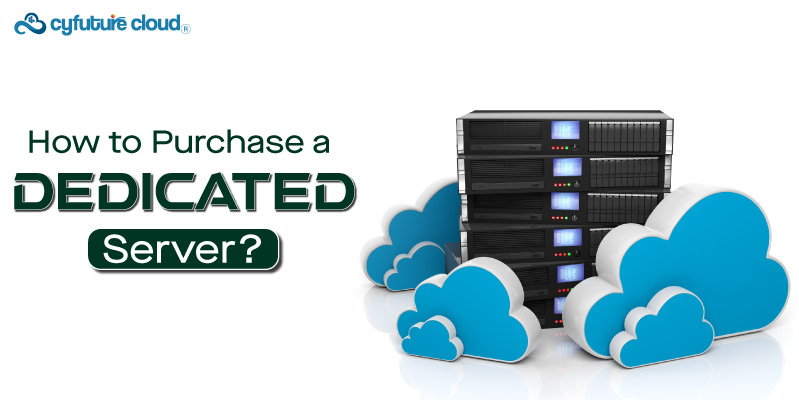 Server
Colocation
Server
Colocation
 CDN
Network
CDN
Network
 Linux Cloud
Hosting
Linux Cloud
Hosting
 VMware Public
Cloud
VMware Public
Cloud
 Multi-Cloud
Hosting
Multi-Cloud
Hosting
 Cloud
Server Hosting
Cloud
Server Hosting
 Kubernetes
Kubernetes
 API Gateway
API Gateway


Are you prepared to use a dedicated server to advance your apps or website? Shared or VPS hosting cannot compare to the total control, flexibility, and performance that dedicated servers provide. Nevertheless, the purchasing procedure might be intimidating given the abundance of vendors and configuration choices available.
We'll go over the essential procedures in this tutorial to help you choose and buy the ideal dedicated server for your requirements:
A physical server that is exclusively given to one customer or organization on lease is referred to as a dedicated server. In contrast to virtual private servers (VPS) and shared hosting, which distribute hardware resources among several customers, a dedicated server offers sole access to and utilisation of the underlying computer infrastructure.
Some key characteristics of dedicated servers:
Physical server hardware (CPU, RAM, storage, networking) is not shared with anyone else
Full administrative control and root access to configure the operating system, software, security, etc.
Ability to select hardware specifications based on performance and workload requirements
Geographic location can be chosen to optimize latency and compliance needs
Higher security isolation compared to multi-tenant environments
Premium availability and uptime guarantees (often 99.9%+)
Dedicated servers are an ideal hosting solution for websites, applications, databases and infrastructure that require:
Maximum server performance and reliability
Complete control over the software environment
Ability to scale up resources as needed
Enhanced security and data privacy
Mission-critical workloads and strict uptime requirements
The main drawback is the higher costs associated with leasing an entire physical server versus sharing smaller slices of resources on shared or virtual environments. Dedicated servers require more technical skills for installation and systems administration as well.
Overall, dedicated hosting is versatile and powerful, giving organizations full server ownership without the capital expense of purchasing hardware. It fills the void between premium private cloud or on-premises infrastructure and VPS services.
A dedicated server may host databases, apps, websites, and other vital tasks with exceptional flexibility, performance, and control. The following knowledge base article outlines the main procedures for choosing and placing an order for a dedicated server:
1. Determine Resource Requirements Start by estimating the CPU, RAM, storage and bandwidth resources you require both now and to accommodate future growth. Consider factors like:
Number of websites/applications
Amount of traffic/monthly visitors
Software used (ex. databases, CRM tools, analytics)
Data storage needs
Most dedicated server providers offer different pre-configured packages or allow you to customize specifications.
2. Select Operating System Choose an operating system based on your technical skills and application needs. Common options include:
Linux distributions like Ubuntu, CentOS, etc.
Windows Server
3. Research Hosting Providers Compare different dedicated server hosts based on:
Uptime guarantees (look for 99.9%+)
Server configurations and customizations available
Data center locations to minimize network latency
Customer support channels and hours
Security features like DDoS protection
Overall reputation and industry expertise
4. Decide on Managed vs Unmanaged Services Unmanaged servers give you full control but require hands-on systems administration. Managed servers include provider support for tasks like:
OS installation, updates and patching
Software deployments
Security monitoring and response
Backup/disaster recovery services
Managed services can simplify operations but come at an additional cost.
5. Configure Server Hardware Most providers allow you to customize specifications like:
CPU cores/vCPUs and speed
RAM in GB
SSD or HDD storage in TB
Public bandwidth in TB
Factor in expected growth and performance needs. Consider getting more RAM and faster CPUs rather than maxing out cores.
6. Review Contracts and Pricing Read and understand all contract terms including:
Initial setup fees
Monthly/annual billing cycles
Bandwidth overages
Contract minimum length
Cancellation/early termination policies
Money-back guarantees
7. Place Order With all options selected, you're ready to pay and submit your dedicated server order. Larger providers can typically provision standard configs within 24-48 hours. Custom configurations may take longer.
8. Access Provisioned Server Upon completion, you'll receive login credentials and IP addresses. Be sure to change the root password and update security groups/firewall rules immediately. Install any required software and transfer any data to begin using your dedicated server!
Let us know if you have any other questions around selecting and purchasing dedicated hosting.
Databases that built with Microsoft Access of SQL server worked by dedicated server
Support for FrontPage, InterDeva of Microsoft Web Development Tools.
Get any Windows server
24*7 Support provided by experts
Microsoft Stack app and Frameworks can be run
Power-packed performance and reliability
Hosted at enterprise-class Tier 4 data center with advanced security.
Root Access
If you anticipate rapid growth for your website, a dedicated server is the best option. Assuming that your website currently uses shared hosting, high traffic will cause it to perform worse and take longer to load. Higher bounce rates and a loss of income may result from this.
You alone are responsible for the security of your website because you have complete control over the server. Sensitive data could be present, such as credit card numbers, private emails, or client information. You have complete control and assume responsibility for the data when you choose dedicated hosting.
Because page loading times affect every element of a website, if your page is loading slowly, it may lead to a higher bounce rate. Make sure you have the bandwidth necessary to improve your page loading speeds.
Control is the one factor above all others that will entice you to get a dedicated server. You have total control over how you choose to utilise your server. You have the option to select the server software of your choice. You also have the ability to change the device specs and select the operating system (OS) that you want to install.

Let’s talk about the future, and make it happen!
By continuing to use and navigate this website, you are agreeing to the use of cookies.
Find out more


